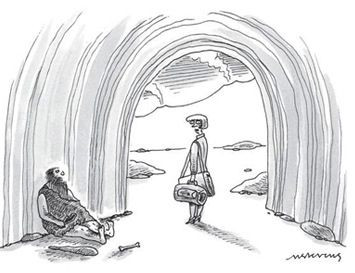Men Are Funnier Than Women: Is The Stereotype Correct?

Men are funnier than women, according to a psychology study from the University of California, San Diego Division of Social Sciences.
“But only just barely and mostly to other men,” the school said this week.
Researchers used New Yorker Cartoons to explore gender stereotypes.
The study, published in the journal Psychonomic Bulletin & Review, consisted of a tournament style rating system, where two captions were placed against each other and participants chose the funnier of the two.
In this study, the top caption was the overall winner, and the bottom one was most often eliminated in the first round.
The findings may have lent some support to the stereotype on gender differences and humor, but the differences were so small that they can’t account for anything more than an ego boost for men.
"The differences we find between men's and women's ability to be funny are so small that they can't account for the strength of the belief in the stereotype," wrote Laura Mickes, postdoctoral researcher, US San Diego Department of Psychology, Ph.D.
Men won the humor test by 0.11 points out of a theoretically possible perfect score of 5.0, while 90 percent of both male and female participants agreed with the stereotype that men are funnier than women.
The study ran two separate but related experiments. The first experiment included 16 undergraduate males and 16 undergraduate females writing captions alone in a room for 20 New Yorker cartoons for 45 minutes. There were a total of 640 captions.
Coauthors on the study are Nicholas Christenfeld, a UC San Diego professor of psychology, graduate students Drew Walker and Julian Parris, and Robert Mankoff, cartoon editor for The New Yorker.
Writing captions may not be the most “natural” way to be funny, Christenfeld and Mickes explained, but it has several distinct advantages, including a level playing field to determine what people are capable of doing as opposed to what they do in social settings and day-to-day life, which could be governed by other factors.
The second part of the first experiment had 34 male and 47 female undergraduates who helped rate the captions written earlier in a five-round knockout tournament. During this time, one cartoon was displayed with two random and anonymous captions, and the raters chose the funnier of the two captions.
The experiment, with new captions each time, was repeated for all 32 captions for each cartoon. The 16 winning captions of round one were then randomly pitted against each other. The number of rounds, from zero to five that captions survived before being knocked out determined the writers' average scores.
Male writers earned an average of 0.11 more points than female writers, which backs up the stereotypical idea that men are funnier than women.
However, the fact that men did better with other men came as quite an interest to the researchers.
“Female raters allocated only an average 0.06 more points to the male writers, while the male raters gave them a significantly higher average of 0.16 more points,” the authors wrote.
"Sad for the guys," said Christenfeld.
"Who think that by being funny they will impress the ladies, but really just impress other men who want to impress the ladies."
In a second, related experiment, the researchers tested memory and memory bias to see if men are credited with being funnier than they really are.
Funny captions and their authors were remembered better than unfunny ones.
However, when the study participants were guessing at authors' gender, unfunny captions were more often misattributed to women and funny captions were more often misattributed to men.
When analyzing the content of the captions, the researchers noted that men used profanity and sexual humor a little more frequently, about 4 percent vs. 2 percent of the time, but according to the authors, that didn't seem to account for the "win" since that style of caption didn't necessarily do better, with either sex.
“It could be that men see more opportunities to take a stab at humor,” said Christenfeld. “It could be that they try harder or more often.”
Further research will be needed to figure out the reasons why men might be slightly “funnier” than women.
Another finding in the study was that, when asked to predict their own performance on a scale of 1-5, the men rated themselves higher than the women.
The men figured they’d get a 2.3, whereas the women, more modestly figured they’d get a 1.5.
"Male confidence, in this domain at least, does seem to outstrip male competence," the researchers wrote.



























